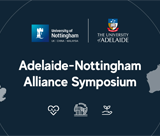
From student to staff at UNNC – Q&A with Dougal Macbeth
January 13th, 2017
Dougal Macbeth is a member of staff in the Centre for English Language Education (CELE) at The University of Nottingham Ningbo China, and was previously a masters student in the School.
He is the winner of the second Mandarin Competition for Foreigners in Ningbo and was named “Zhuang Yuan”, which is a Chinese term for the highest ranking candidate in a competitive exam.
You recently won a Mandarin competition. What is the name of the competition? When was it? How did you hear about it? What prompted you to participate in it?
It was the ‘Second Ningbo Foreigner’s Mandarin Competition’, held on Wednesday 14 September at Tianyi Pavillion, the oldest library in China still standing. I received emails about it from two colleagues, who had both recommended my participation to the Confucius Institute at UNNC. I participated because our school needed a representative, and it felt like a fun thing to do.
What was it like participating in the competition? What was your choice of contribution/performance and why?
Each participant was required to prepare a short speech on their experience of traditional Chinese festivals, and a short performance of their choosing, as well as completing a character-reading task on stage. There was an interesting mix of participants, from a variety of different backgrounds. In the audience, I sat in between a Russian student who performed ‘kuai-ban’, and a Ghanaian who danced.
When it was my turn, I spoke about differences in the celebration of Spring Festival between the Northeast of China where I had lived for two years, and Yunnan province, my fiancée’s hometown. My performance was an erhu (Chinese bowed two-stringed lute) solo “Horse Race”, inspired by a traditional Mongolian folksong. I rushed through my speech because it was a little long, but I was struck with the beautiful acoustics of the hall as soon as I played the first bar on my erhu, and thoroughly enjoyed that performance.
How did you achieve such a high level of fluency in Mandarin? Any tips for others learning Mandarin?
I studied formally for three years in New Zealand, and have been living in China for four, studying more sporadically here when I’ve had time. I think it would be expected to have developed some proficiency after all this immersion. For anyone studying a language, I would recommend taking advantage of the powerful computer-assisted language learning software available these days, such as a good flashcard system based on spaced-repetition (SRS). Flashcards require active recall – you aren’t just passively viewing the language; you need to retrieve the information from your memory. SRS aims to test you on language just before you are about to forget it, to ensure a balance between forgetting words, and wasting time reviewing words you know well.
Using mnemonics to form strong associations can maximize retention as well. Words are like the building blocks of language, and after memorizing the fundamental vocabulary of a language you can pick up more words effortlessly just by listening or reading, through understanding the meaning of unfamiliar words in enough different contexts of words you do know.
What is it like moving from being a School of English MA student to UNNC staff in CELE?
As I had already been doing similar work for the past few years (including tutoring IAT part-time at Nottingham while doing my MA), this was a non-issue. Starting full-time with CELE was much easier for me than for other teachers because I already knew the campus, city, and of course Chinese language and culture.
Any tips you would like to share with international students coming to study in the School of English at UNNC, or to UNNC in general?
Try to venture beyond the comfort of the international bubble. Get involved in the clubs and organizations, and if you have the chance to stay in a Chinese home over the holidays, take it!
This interview originally appeared in ‘The Cool of English‘ – the student bulletin sent by the School of English at UNNC. Interviewer: Candace Veecock (via email).
Tags: CELE, Centre for English Language Education, China, international, language, Mandarin, University of Nottingham Ningbo China, UNNC
Leave a Reply
Other News
Trusted Research update: changes to technologies requiring an export control licence
The UK Government has issued an updated UK Strategic Control List, introducing additional export control measures […]

Adelaide-Nottingham Alliance: join Vice-Chancellors at event celebrating global partnership
Staff, students and researchers are invited to join the Vice-Chancellors of the University of Nottingham and […]

